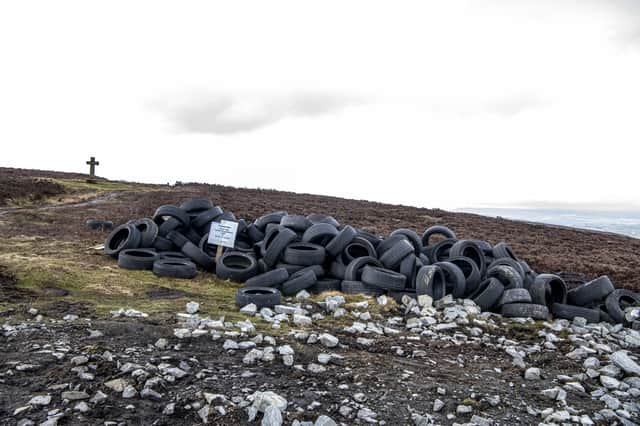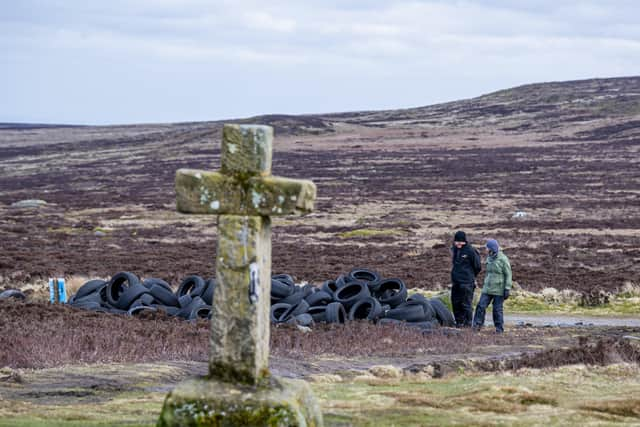Flytipping: what must be done to tackle these crimes – Dorothy Fairburn


While councils in England have dealt with just under one million fly-tipping incidents during this time, these figures account for waste illegally dumped on public land reported to these authorities.
In our region there were more than 90,000 fly-tipping incidents during the reporting period. However, the vast majority of incidents on privately-owned land, which are thought to be ‘significantly more’, aren’t included, so these figures do not reflect the true scale of this type of organised crime, which blights our rural communities.
Advertisement
Hide AdAdvertisement
Hide AdNot only is fly-tipping dangerous, unsightly and costly to clear up, but it can cause harm to people and animals, pollute watercourses and damages the environment.


The most common size category for fly-tipping incidents in 2019-20 was equivalent to a ‘small van load’ (34 per cent of total incidents), followed by the equivalent of a ‘car boot or less’ (28 per cent).
More and more waste crime cases are on an industrial-size scale, particularly when the land is located on the fringes of urban areas. As these incidents show, it is large household items, building materials, hazardous waste and even deadstock being dumped across our countryside because the perpetrators know they can get away with it.
The severity of this continuing scourge on our landscapes prompted the Country Land and Business Association (CLA) to launch a five-point action plan for tackling fly-tipping more robustly by the imposition of tougher penalties, including the seizing of vehicles. Although the maximum fine for anyone caught fly-tipping is £50,000 or 12 months imprisonment, this is seldom enforced by magistrates.
Advertisement
Hide AdAdvertisement
Hide AdRecognising the lack of council resources, the CLA is also calling for greater investment and time in tracking the culprits, and for a speedier and more effective legal system to deal with offenders. Frequently, it costs more to bring an offender to court than the penalty actually imposed.


Across the region only 20 vehicles were seized, with only Hull and York councils imposing two fines of more than £5,000, and more generally, less than 1,000 fixed penalty notices were issued for littering and fly-tipping. Unless tougher action is taken to combat this kind of rural crime, it will continue to increase.
Fly-tipping is not a victimless crime. Private landowners are fed up of clearing away other people’s rubbish andn early two-thirds of farmers have been a victim.
The CLA is calling on the Government to remove landowner liability to clear up waste on private land and for local councils to allow any private landowner to dispose of fly-tipped rubbish at a waste disposal site free of charge. The estimated average cost to farmers and rural businesses of this anti-social behaviour is around a £1,000 per incident to clear their land.
Advertisement
Hide AdAdvertisement
Hide AdOne CLA member, who is regularly subjected to fly-tipping, is having to pay £50,000 each year for rubbish, such as tyres, fridges, tents, barbecues and building waste, to be cleared. Local authorities need to start sharing the brunt of these costs.
The CLA will support both local councils and the police in achieving the positive outcomes, especially in rural areas which are quite often seen as a soft touch by those fly-tipping their waste.
In tandem with harsher penalties, there should also be initiatives to tackle the attitudes and behaviours that lead to people not taking responsibility for the waste they create.
We urge everyone to dispose of their rubbish responsibly by checking when their local recycling centre is open and taking it there. Home owners have a legal duty to ensure that waste is disposed of legally.
Advertisement
Hide AdAdvertisement
Hide AdThis means that the property owner could face a fine if their waste carrier fly tips their rubbish, so it would be prudent to keep a copy of their Waste Carriers Licence, and details of the vehicles used in transporting waste away from their property.
Fly-tipping can be reported to local councils via a dedicated online https://www.gov.uk/report-flytipping. Waste crime can also be reported in confidence and anonymously to Crimestoppers, by telephoning 0800 555 111.
Dorothy Fairburn is regional director of the CLA.
Support The Yorkshire Post and become a subscriber today. Your subscription will help us to continue to bring quality news to the people of Yorkshire. In return, you’ll see fewer ads on site, get free access to our app and receive exclusive members-only offers. Click here to subscribe.
Comment Guidelines
National World encourages reader discussion on our stories. User feedback, insights and back-and-forth exchanges add a rich layer of context to reporting. Please review our Community Guidelines before commenting.